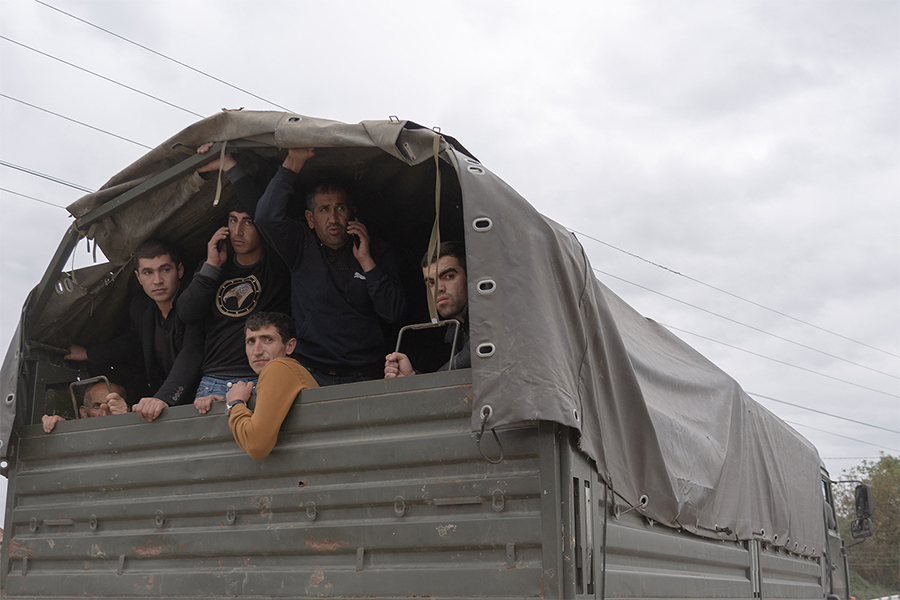On Sept. 19, Azerbaijan launched what it claimed to be an anti-terrorist operation in Nagorno-Karabakh. Within 24 hours, the operation ended with a ceasefire agreement between Azerbaijani and Armenian forces.
Armenia is a small country between Azerbaijan and Turkey with a population of about 3 million people. Both Armenia and Azerbaijan were a part of the USSR. Since the fall of the Soviet Union, Armenia has been engaged in military and political disputes with Azerbaijan over the Nagorno-Karabakh region.
Junior Julia Freitor said she is Armenian on her mother’s side and has family living in the country. Freitor said she is deeply concerned about the attacks on Armenian heritage and culture.
“To me, it is like the equivalent of if someone went to Belize and started destroying Mayan temples,” Freitor said. “Because even though it’s not in Armenian land, it is Armenian culture.”
Adam Smith, distinguished professor of arts and sciences in anthropology at Cornell University, is one of the co-directors of Caucasus Heritage Watch. CHW is a cultural monitoring organization with research team members at Cornell and Purdue University. Smith said CHW works with Planet to capture satellite images of the areas they are monitoring and was founded in 2020.
In its June 2023 report, CHW found that several cemeteries, mosques and churches were destroyed, damaged or threatened in Nagorno-Karabakh.
“An attack on a monument that’s vital to the integrity of a culture is an attack on the people themselves,” Smith said. “As archaeologists, we’re fundamentally committed to the idea that people are made by their stuff, their things. That’s what makes communities communities. So in order to dismantle the community and attack on a community, an attack on the heritage is part of that.”
Freitor is also a dual citizen of Russia and the U.S., which according to her are the two significantly influential countries that can help the situation.
“What I will say about the lack of interference from countries is, it’s shocking what people do for politics,” Freitor said. “The only thing we can really do right now is urge our senators and beg our senators and beg America and beg Congress to step in.”
Smith said that as an organization, the CHW does not take a political stance. It instead seeks to defend attacks on cultural heritage through its satellite imaging to track damage on both sides. Smith said this means that CHW also tracks satellite images on the Azerbaijani side, which leads him to consider the Azerbaijani perspective on the conflict.
“We have no policy in terms of what we think should or should not have happened,” Smith said. “What we were able to conclude [about Azerbaijani heritage under Armenian control] in contrast with the situation of Armenian heritage under Azerbaijan, was that there was no program of government-sponsored cultural erasure.”
Cornell senior Alexander Arejian is a descendant of survivors of the 1915 Armenian genocide and said he studies government. Arejian said countries like Turkey that have openly expressed support for Azerbaijan’s attacks on Armenia should be viewed from a critical lens because of their past political stances.
“I think it’s unfortunate that both [Turkey and Azerbaijan] have a long history of authoritarian human rights violations against various ethnic groups, but specifically with the Armenians,” Arejian said. “These are the same oppressors who drove us out of our historical lands 108 years ago.”
Arejian said that when he was a first-year student, he volunteered as a tutor for students in Armenia who were displaced because of the 2020 war and the COVID-19 pandemic.
“What’s really sad is, I haven’t been able to reach out to some of these kids,” Arejian said. “I don’t know what is going on with them and what has happened. I mean, these are literally like fourth, fifth and sixth graders. … I wish the best for them but the reality of the situation is, kids have died.”
Areijan said he is concerned about how disconnected the rest of the world seems from the issues in the Nagorno-Karabakh region.
“It is incredibly disheartening to see the world not react to these events with a similar sense of urgency [as other news],” Arejian said. “It’s almost like history repeating itself in a way.”
Maya Martirossyan, a sixth-year graduate Ph.D. student at Cornell, is Armenian-American and said she also observed a lack of Western media coverage of the Nagorno-Karabakh conflict.
“The thing I’m most concerned about right now is the unfolding humanitarian disaster that is happening in Artsakh, which is really not … in the Western media narrative,” Martirossyan said.
Martirossyan said that being Armenian in Ithaca is different from being Armenian in a bigger city because not everyone understands the background, history and context of the political turmoil between Armenia and Azerbaijan.
“The thing about being Armenian in Ithaca … is people don’t really know what you are,” Martirossyan said. “They don’t know that you have this other world that occupies you all the time.”
Martirossyan said individuals can contribute by learning more about the conflict through resources like the International Armenian Literary Alliance and by donating to groups like All for Armenia and the Armenian General Benevolent Union.
Freitor said individuals in Ithaca can also support the Armenian community by educating themselves about the issue and understanding that the conflict takes a serious emotional toll on them.
“It feels like we’re just screaming into the void and getting nothing in return,” Freitor said. “We’re really asking bare minimum here: reading our stories, listening to our stories, amplifying our voices and also respecting that we’re not OK.”














